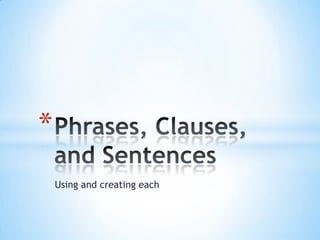Phrases, clauses and sentences
- 1. * Using and creating each
- 2. * Phrases are a group of words that lacks a subject, predicate, or both. * Phrases can take many different forms: * Prepositional phrases * Verb phrases * Adjective phrases * Adverb phrases * Noun phrases * Verbial phrases *
- 3. * Prepositional Phrases * Begin with a preposition (a word that shows position, location, or direction) * Ends with an object of the preposition (noun or pronoun) * Can be used as adjectives (words that describe a noun or pronoun). Adjectives answer what kind, how many, which one * Can be used as Adverbs (words that describe verbs, adjectives, or other adverbs). Adverbs answer where, when, how, or to what extent *
- 4. * Verbial phrases * Verbs that act as other parts of speech * Types: * Gerund phrase = Verb ending in ING and is used as a noun. Example: Swimming is a fun exercise. * Participle phrase = Verb ending in ING or ED is used as an adjective. Example: 1. Rattling in the cabinets, the dishes were about to crash to the floor. 2. Why didnŌĆÖt the tired boy just stand still? * Infinitive phrase = Verb that starts with to and is used as a noun, adjective, or adverb. Example: I am afraid to swim. *
- 5. * A clause is group of related words that has both a subject and a predicate. They DO NOT have to form a complete thought. * Types: * Independent * Dependent *
- 6. * Independent Clauses: * Have a subject and a predicate and can stand alone as a sentence. * When standing alone, an independent clause is ALWAYS a simple sentence (ONE subject and ONE predicate only) * Example: This ancient oak tree may eventually be cut down. *
- 7. * Dependent Clause: * Have a subject and a predicate, but will NEVER express a complete thought. * These clauses can not be a sentence by itself. * A dependent clause depends on being connected to an independent clause to make sense. * These clauses are also known as SUBODINATING CLAUSES because of the words that start them (subordinating conjunctions: AFTER, ALTHOUGH, BECAUSE, BEFORE, IF, SINCE, WHEN, etc.) * The following words can also start a dependent clause: who, which, whose, that *
- 8. * A sentence has at least one subject, at least one predicate, and expresses a complete thought. * A sentence ALWAYS begins with a capital letter * A sentence ALWAYS ends with a period, question mark, or exclamation mark *
- 9. * Simple sentences: * A simple sentence is one independent clause. * Simple sentences may contain a simple or compound subject * Simple sentences may contain a simple or compound predicate. * John and his friend played basketball after school. * Icebergs form glaciers and float in the ocean. *
- 10. * Compound sentences: * Happen when two or more simple sentences (independent clauses) are combined with each other. * When making a compound sentence, you must use the words For, And, Nor, But, Or, Yet, So * Use the acronym FANBOYS to help you remember. * The FANBOYS cannot begin a sentence (They are COMBINING words) *
- 11. * Complex sentences: * Combine a dependent clause and an independent clause together. * When making a complex sentence, you must use a subordinating conjunction or a relative pronoun. * See page 710 and page 744 for a complete list of these words *
- 12. * Complex sentences: * If a dependent clause comes first, a comma is used after the clause. * Example: When I left for home, my aunt stood teary-eyed in the doorway. * If a dependent clause comes last, no comma is needed. * Example: My uncle Louis died soon after I left for home. *
- 13. * The four types of sentences include: * Imperative = giving a command * Interrogative = asking a question * Declarative = making a statement * Exclamatory = showing emotion * Each sentence ends with a different type of punctuation. * The imperative sentence can have what is known as an understood ŌĆ£youŌĆØ. This means the subject is not explicitly stated, but must be interpreted. *












